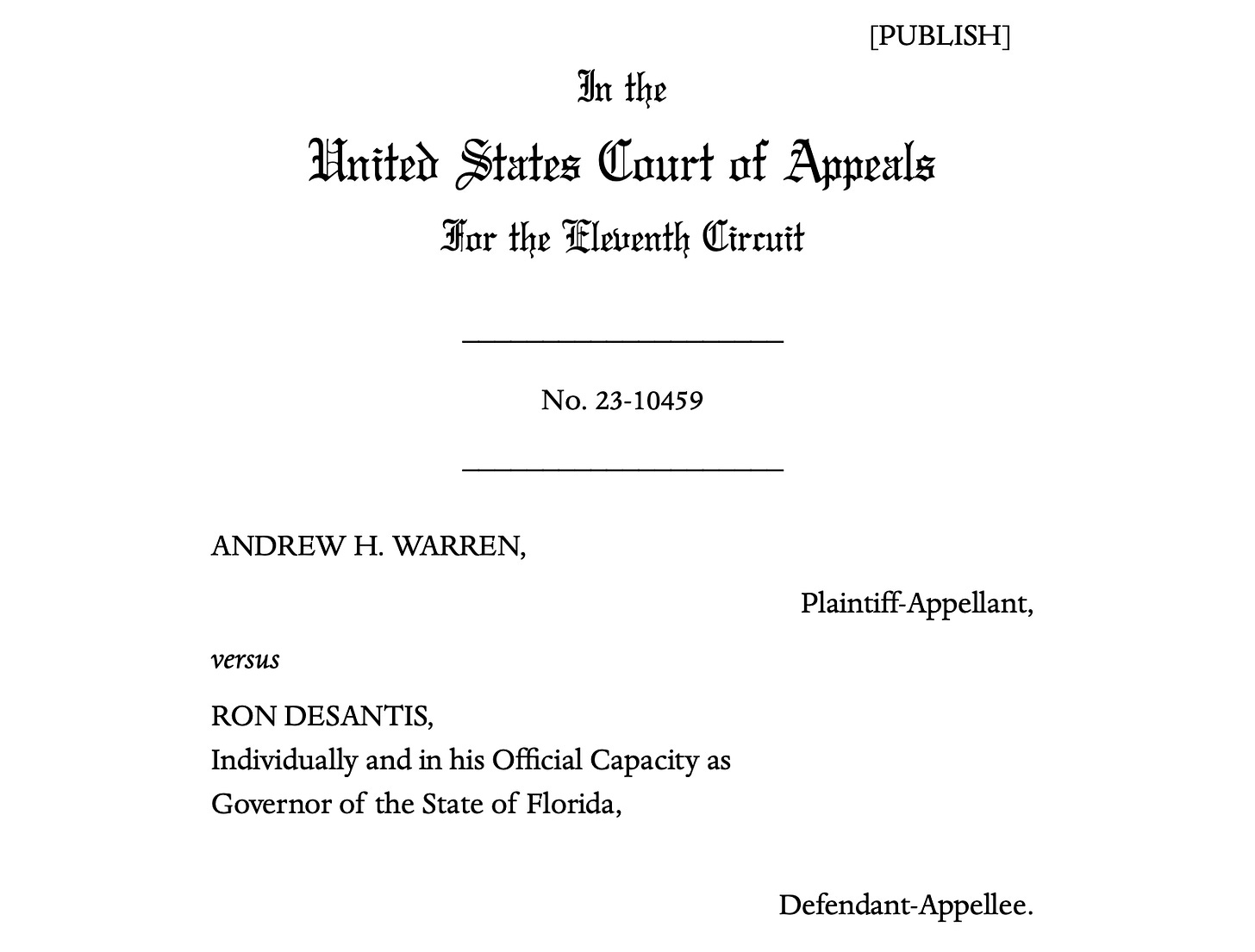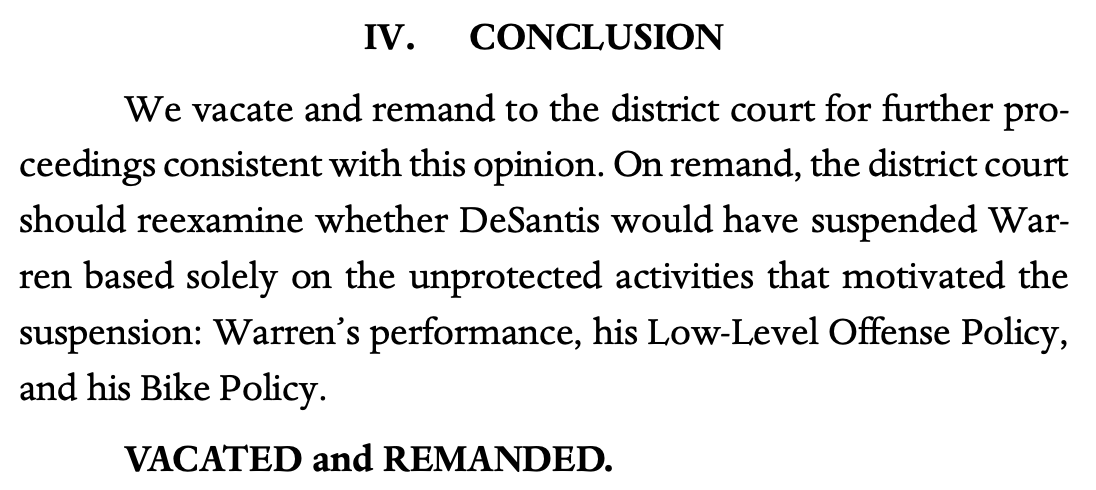Appeals court suggests DeSantis prosecutor suspension could violate First Amendment
A Trump appointee, agreeing with the majority, wrote that "the state can’t exercise its coercive power to censor so-called 'woke' speech with which it disagrees."
The U.S. Court of Appeals for the Eleventh Circuit on Wednesday harshly criticized Florida Gov. Ron DeSantis’s 2022 suspension of the elected prosecutor for Hillsborough County, Andrew Warren, highlighting the district court’s findings that “DeSantis never suspended Warren because DeSantis disagreed with his actual office policies or case decisions.”
The three-judge appeals court panel — which included two Republican appointees — ruled that Warren’s First Amendment retaliation case be sent back to the district court for another look that will strongly favor the ousted prosecutor in his effort to be reinstated.
The unanimous opinion, by Judge Jill Pryor, detailed how little investigation the Republican governor’s staff had done into Warren’s actual policy implementation — to the point of ignoring information found that would have reflected favorably upon Warren.
Pryor, an Obama appointee, wrote that instead, “DeSantis based Warren’s suspension on his reputation as a ‘reform prosecutor.’ DeSantis’s political benefit was solely derived from Warren’s political ideology.” The executive order suspending Warren and DeSantis’s comments surrounding the order focused in on two advocacy statements — not office policies — that Warren had signed onto along with other prosecutors opposing the U.S. Supreme Court’s decision overturning Roe v. Wade and opposing anti-transgender laws.
After Warren’s case had been heard at a bench trial, the district court found that Warren met his initial burden showing that he had engaged in protected First Amendment activity; he had faced adverse action (his suspension); and the suspension was motivated, at least in part, by the protected activity. Under existing Supreme Court precedent, DeSantis then had to show that “he would have made the same decision regardless of [the] protected activity.”
The district court examined six factors motivating DeSantis’s decision to suspend Warren and concluded that only two of them were protected by the First Amendment. As the appeals court summed it up:
The district court finally found that DeSantis would have suspended Warren based on one of the other factors — the anticipated political benefit — regardless of the two protected factors. As such, it ruled that Warren’s claim failed.
At the Eleventh Circuit, however, the panel held that the district court got the First Amendment analysis wrong as to both the third and sixth factors it considered. As to the sentence in the abortion statement, the court concluded that the lower court was wrong to take the single sentence out of context:
Most significantly, though, was the appeals court’s holding regarding and discussion of DeSantis’s anticipated political benefit from suspending Warren.
In short, the court held that DeSantis can seek political benefit — but not as a way of punishing Warren’s First Amendment-protected activity.
As such, the court held:
The court did not rule on that ultimate question, vacating the district court’s ruling and sending the case back for the district court to reweigh the factors in light of the appeals court’s analysis.
This would mean that DeSantis will, in effect, get another bite at the apple by being given another chance to justify his action. But, the evidence established at the district court already — which was recited in the appeals court decision — along with the appeals court’s legal conclusions all but decide the case.
The district court previously found that Warren’s retaliation claim failed because DeSantis suspended Warren for the political benefit DeSantis believed he would get from suspending a “reform prosecutor.” Now, the appeals court has held that “the anticipated political benefit cannot be based on protected activity.” The appeals court also has now established that 1, 2, and 3 were protected activity and has reiterated the district court’s findings that 4 and 5 were “pretext to justify the suspension under the Florida Constitution” that remained mostly unexamined by DeSantis and his staff otherwise in making the decision to suspend Warren.
This leaves DeSantis in a tough position. He can seek en banc review from the full Eleventh Circuit, but it’s important to note that the panel consisted of two Republican appointees — including a Trump appointee, Judge Kevin Newsom.
Newsom didn’t only join Pryor’s opinion — which he did — he also wrote separately to underline some of the points made in the court’s opinion and criticize DeSantis’s actions.
Newsom highlighted the fact that, aside from the full context of the abortion statement, Warren gave an interview soon thereafter where he made absolutely clear that the advocacy statement was not policy and that any relevant situation would be considered on the basis of that case and in light of court rulings on Florida’s laws.
DeSantis’s office knew about that and ignored it, Newsom then wrote, citing the district court’s ruling:
Poking right at DeSantis’s favorite word, Newsom concluded his concurrence by writing that “the state can’t exercise its coercive power to censor so-called ‘woke’ speech with which it disagrees.”
So, DeSantis is stuck in the position of going back to the district court — where most of what needs to be established for a ruling against him has already been found by the district court — or of seeking review of this unanimous ruling by three judges appointed by presidents of both parties.
If he does seek further review, he could do so either by seeking en banc review at the Eleventh Circuit or seeking certiorari from the Supreme Court. Notably, the Eleventh Circuit currently sits at seven Republican appointees and five Democratic appointees. As such, DeSantis could have a request for en banc review denied unless all of the Republican appointees aside from Newsom and a Democratic appointee were to side with a DeSantis request for the court to rehear the case en banc.1
The third panelist is a senior district judge sitting by designation, Judge Anne Conway — from Florida — so she would neither vote on the rehearing petition nor participate in an en banc rehearing if it were granted.





![When analyzed within its context, Warren’s act of signing onto an advocacy statement that had a sentence expressing signa- tories’ “commit[ment] to exercise [their] well-settled discretion and refrain from prosecuting those who seek, provide, or support abor- tions” enjoys First Amendment protection. Doc. 112-5 at 1. Rather than making a policy decision, Warren made a protected statement of future conduct. When analyzed within its context, Warren’s act of signing onto an advocacy statement that had a sentence expressing signa- tories’ “commit[ment] to exercise [their] well-settled discretion and refrain from prosecuting those who seek, provide, or support abor- tions” enjoys First Amendment protection. Doc. 112-5 at 1. Rather than making a policy decision, Warren made a protected statement of future conduct.](https://substackcdn.com/image/fetch/$s_!n24H!,w_1456,c_limit,f_auto,q_auto:good,fl_progressive:steep/https%3A%2F%2Fsubstack-post-media.s3.amazonaws.com%2Fpublic%2Fimages%2F6f1934b3-a2fe-401e-a058-ed122f0a95d8_1126x416.png)



![The district court also found as fact that “[t]he Governor’s office knew about Mr. Warren’s statements” clarifying his position on abortion-related matters. Id. In particular, the court found that DeSantis’s general counsel originally included in the draft order suspending Warren a “sentence acknowledging [his] statement in the FOX-13 interview that he would exercise discretion whether to prosecute abortion crimes based on the ‘facts and circumstances of every case,’” but that the acknowledgment was eventually “re- moved from the draft” when it couldn’t be convincingly explained. Id. at 23. The district court also found as fact that “[t]he Governor’s office knew about Mr. Warren’s statements” clarifying his position on abortion-related matters. Id. In particular, the court found that DeSantis’s general counsel originally included in the draft order suspending Warren a “sentence acknowledging [his] statement in the FOX-13 interview that he would exercise discretion whether to prosecute abortion crimes based on the ‘facts and circumstances of every case,’” but that the acknowledgment was eventually “re- moved from the draft” when it couldn’t be convincingly explained. Id. at 23.](https://substackcdn.com/image/fetch/$s_!-jr7!,w_1456,c_limit,f_auto,q_auto:good,fl_progressive:steep/https%3A%2F%2Fsubstack-post-media.s3.amazonaws.com%2Fpublic%2Fimages%2F1a1ad348-a270-4768-93c2-c0406f5c6b57_1100x572.png)
Considering that Warren was an elected official, resolution of this dispute - which is not the least bit factually complex - really needed to be resolved much quicker. DeSantis effectively got what he wanted in depriving voters of who they elected no matter the outcome and Warren has now announced that he won't seek re-election to reclaim his office.
If I understand this correctly,
Warren is basically saying, as a prosecutor, he would recuse(?) himself from prosecution of anyone involved in an abortion in
Florida, thereby not violating
FL abortion law. But he's free
to express his 1st amendment
rights without it jeopardizing
his job.